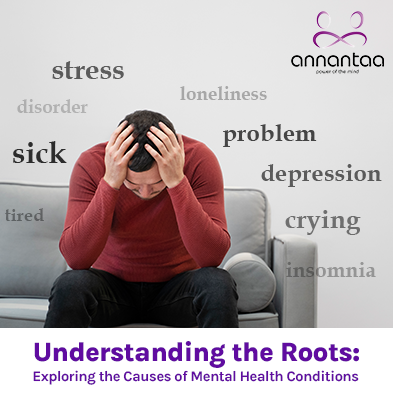
Mental health is a crucial aspect of our overall well-being, influencing how we think, feel, and act in our daily lives. Just as we prioritise our physical health, it is essential to care for our mental health as well. In this blog, we have discussed ways to improve your mental health and help you become the best version of yourself.
Understanding mental health
Understanding mental health involves recognising the complexities of the interplay of emotional, psychological, and social factors that influence our well-being. It encompasses how we think, feel, and behave, impacting every aspect of our lives from relationships to productivity. Mental health is not the absence of mental illness but also includes resilience, coping mechanisms, and the ability to navigate life’s challenges. By fostering awareness and empathy, we can break down stigma, promote early intervention, and support holistic approaches to mental wellness for ourselves and others. Understanding mental health is the key to fostering a supportive and inclusive society of tomorrow.
Stigma-associated mental health
Despite increasing awareness today, the stigma surrounding mental health persists. Many people hesitate to seek help due to the fear of judgement or perceived misunderstanding from the person at the other end. Therefore, it is vital to recognise that seeking help is a sign of strength, not weakness. Addressing mental health openly and without shame is essential for overall well-being.
Recognise and understand your emotions
The journey to better mental health begins with understanding your emotions. Pay attention to what triggers certain feelings and how you react to them. Keeping a journal can help you track your mood and identity patterns. By becoming more self-aware, you can manage your emotions more effectively and respond to situations in a healthier manner. Understanding your emotions allows you to respond to challenges more constructively and seek appropriate support when needed. It empowers you to cultivate resilience, improve relationships, and maintain a balanced mental state, ultimately contributing to a healthier and more fulfilling life.
Developing a support system
Building a strong support system is vital for mental well-being. Surround yourself with people who uplift and support you. This can include family, friends, or support from an experienced mental health professional. Do not hesitate to reach out and talk about your feelings. Knowing someone is there for you sometimes makes all the difference you need.
Practice mindfulness and meditation
Mindfulness and meditation are powerful tools for improving mental health. Mindfulness involves staying present and being fully engaged in the present moment. Meditation, on the other hand, involves focused attention and relaxed techniques. Both practices can reduce stress, improve focus, and enhance emotional regulation. Start with a few minutes each day and gradually increase the duration as you become more comfortable.
Prioritise physical health
Physical and mental health are closely interrelated. Regular exercise releases endorphins, which are natural mood lifters. Aim for at least thirty minutes of moderate exercise throughout the week. Additionally, it is important to maintain a balanced diet filled with fruits, vegetables, lean proteins, and whole grains. Avoid excessive consumption of caffeine, alcohol, and processed foods, as they can negatively impact your mood and energy levels.
Establish healthy sleeping habits
Quality sleep is an essential pillar of mental health. Lack of sleep can exacerbate feelings of anxiety and stress. Aim for 7-8 hours of sleep per night. Establish a healthy bedtime routine to signal to your body that it’s time to wind down. Another suggestion is to avoid screens at least an hour before bed, thus creating a comfortable sleep environment.
Manage stress effectively
Stress is a common part of life, but chronic stress can harm your mental health. It is important to develop effective stress management techniques such as breathing exercises or yoga. Prioritise your tasks and learn to do tasks when necessary. Taking breaks when needed and setting realistic goals can help manage stress levels.
Engage in activities you enjoy
Spending time doing activities you enjoy can boost your mood and mental health in a significant way. You can engage in anything from participating in sports to enjoying music, reading, or travelling, ensuring you make time for these activities that bring you joy. Engaging in activities you love can provide a sense of accomplishment and help you relax.
Set realistic goals
Setting realistic and achievable goals can give you a sense of purpose and direction. Break down large goals into smaller, manageable steps. Celebrate your progress along the way, no matter how small. This can boost your confidence and motivation, positively affecting your mental health.
Foster positive relationships
Healthy relationships are the foundation of having good mental health. Foster positive relationships by being kind, supportive, and respectful to others. It is important to turn away from toxic relationships that drain your energy and contribute to negative feelings. Building strong, positive connections can provide emotional support and increase your sense of belonging.
Seek professional help when needed
Due to the stigma associated with mental health, many people do not seek help when needed. Seeking help from a reputed mental health professional is the best way to navigate difficult times. If you are experiencing persistent periods of sadness, anxiety, or other mental health issues, do not hesitate to reach out for professional support. Therapy shall provide you with the tools and insights to manage your mental health effectively.
It is crucial to recognise when self-help strategies are not enough and seek professional help. Persistent feelings of sadness, anxiety, or stress that interfere with daily life are signs to reach out for support. Look for licensed professionals with experience in treating your specific issues. Seek recommendations from trusted sources and consider initial consultations to find a good fit. Taking charge of your well-being involves proactive steps to improve your mental health. By incorporating mindfulness, exercise, healthy eating, quality sleep, strong social connections, and effective stress management, you can significantly improve your mental health. Prioritising your mental health can positively impact every aspect of your life, leading to greater happiness and fulfilment.


